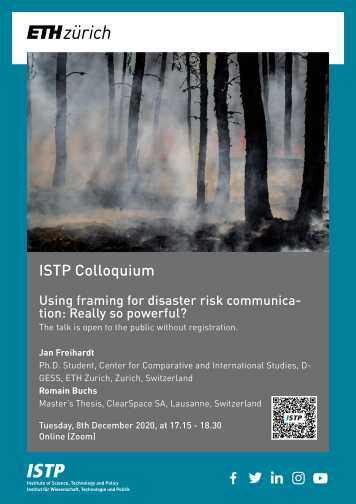Colloquium: Jan Freihardt & Romain Buchs
Tuesday, 8th December 2020, at 17.15 - 18.30
Online (Zoom): To receive the Zoom Meeting link, please register here.
Using framing for disaster risk communication: Really so powerful?

In a warming world, many societies face increasingly frequent and severe natural disasters. Adaptive measures can help decrease the resulting human and material losses. While policymakers can enforce such adaptive measures, they might not be willing or able to do so for all measures that appear desirable from a societal viewpoint. Thus, they often try to incentivize citizens to implement such measures voluntarily. Disaster risk communication plays a crucial role in motivating adaptive behavior. Since disasters involve potential human and material losses, the corresponding risk messages are prone to be affected by framing effects. A frame is a way in which a certain situation is depicted, for instance, whether the focus is on what can be gained or what can be lost. Even if the actual information content is identical, such positive or negative framing can influence how humans perceive the risk message. Therefore, policymakers need a solid understanding of framing effects to design effective risk communication and avoid potentially undesired side effects.
We present empirical evidence from a series of online survey experiments exploring the effects of framing in disaster risk communication. We found framing to be less impactful than has previously been found in the literature. Therefore, we argue that framing might be a less powerful tool than it is commonly thought of when applied in complex real-world settings.
Jan Freihardt
Jan Freihardt started his Ph.D. at ETH Zurich in September 2019. He holds a Master's degree in Environmental Engineering from ETH and is currently enrolled in a second Master's in Science, Technology and Policy. Besides academia, Jan has been active in different environmental NGOs in Germany for years and is particularly interested in the interaction of academic institutions and civil society. He has co-organized several seminars on this topic and is currently working on a external page book project about transdisciplinary and transformative science. In his Ph.D., Jan is researching Environmental Migration under the SNF-project external page Climate Risk, Land Loss, and Migration: Evidence from a Quasi-Experiment in Bangladesh.
external page Curriculum Vitae
Find out more about the speaker